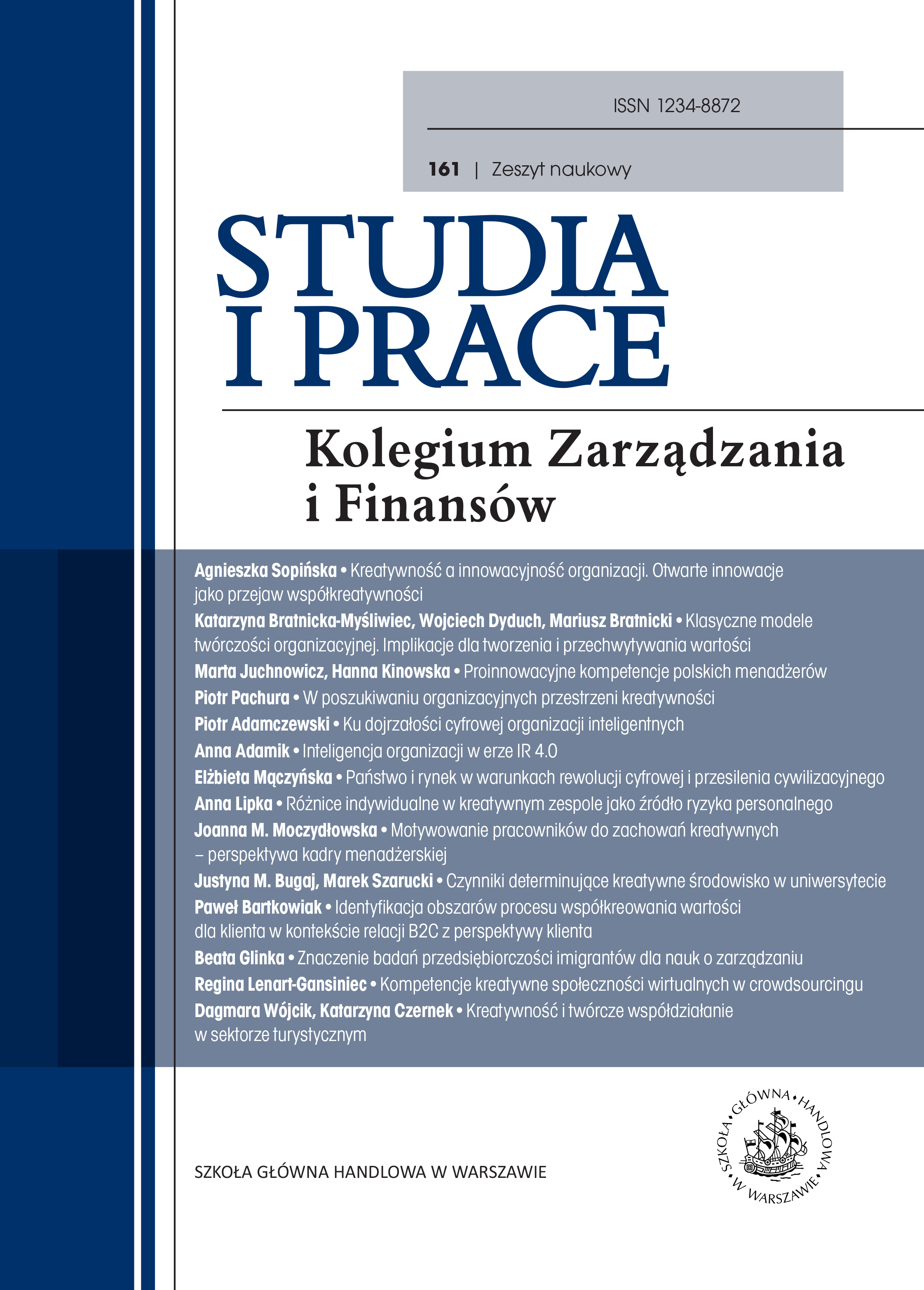Towards Digital Maturity of Intelligent Organisations
DOI:
https://doi.org/10.33119/SIP.2018.161.5Keywords:
digital maturity, IoT, intelligent organisation, SMAC, knowledge managementAbstract
The aspirations to achieve a digital maturity, i.e. the state which allows a business organisation to improve its effectiveness thanks to the application of advanced ICT solutions have never been so great before. A dynamic development of information communication technologies has led to the popularisation of the so-called third platform called SMAC (Social, Mobile, Analytics, Cloud), creating, together with the IoT (Internet of Things), a specific eco-system of IT solutions in the global economy intelligent organisations. The article is aimed at the presentation of the direction of evolution of management processes support in intelligent organisations in the course of achieving digital maturity. The considerations are illustrated with the results of author’s own research of the SME sector on the example of selected enterprises in the Masovian and Greater Poland voivodeships in the period of 2014–2017.
Downloads
References
Economy,
„Management” 2016, vol. 20, no. 2.
2. Adamczewski P., E-logistics as the ICT Support in Modern Polish Organizations, „Chinese Business
Review” 2017, vol. 16, no. 8.
3. Adamczewski P., The Process of Digital Maturing on Intelligent Organizations, „Scientific Challenges.
Economic and Legal Challenges” 2018, vol. I, National Academy of Scientific Development,
Lvov 2018.
4. Arak P., Bobiński A., Czas na przyspieszenie. Cyfryzacja gospodarki Polski, Polityka Insight,
Warszawa 2016.
5. Beckford J., The Intelligent Organization. Realising the Value of Information, Routledge – Taylor
& Francis Group, London, New York 2016.
6. Cisco Global Cloud Index 2013–2018, Cisco Systems Inc., San Jose 2014.
7. Corcoran P., Datta S. K., Mobile-edge Computing and the Internet of Things for Consumers:
Extending Cloud Computing and Services to the Edge of the Network, „IEEE Consumer Electronic
Magazine” 2016, vol. 5, no. 4.
8. Cyfryzacja gospodarki i społeczeństwa – szanse i wyzwania dla sektorów infrastrukturalnych,
red. J. Gajewski, W. Paprocki, J. Pieriegud, Instytut Badań nad Gospodarką Rynkową, Gdańsk
2016.
9. Denecken S., Conquering Disruption Through Digital Transformation, SAP White Paper, New
York 2015.
10. Gartner Group, Top 10 Strategic Technology Trends for 2018, New York 2017.
11. Grösser S. N., Zeier R., Systematic Management for Intelligent Organizations, Springer-Verlag,
Berlin, Heidelberg 2012.
12. https://ec.europa.eu/digital-single-market/desi
13. IBM Solutions Connect, Warszawa 2016.
14. Internet of Things. Nowy paradygmat rynku, red. Ł. Sułkowski, D. Kaczorowska-Spychalska,
Difin, Warszawa 2018.
15. Jurek J., Wdożenia informatycznych systemów zarządzania, Wydawnictwo Naukowe PWN,
Warszawa 2016.
16. Kisielnicki J., Systemy informatyczne zarządzania, Placet, Warszawa 2013.
17. Lechman E., The Diffusion of ICT, Routledge – Taylor & Francis Group, London, New York
2018.
18. Marz N., Warren J., Big Data, Manningan Publications Co., New York 2015.
19. McConnell J., The Organization in the Digital Age, New York 2017.
20. Perera Ch., Ranjan R., Wang L., Khan S., Zomaya A., Privacy of Big Data in the Internet of
Things Era, „IEEE IT Professional Magazine” 2015, PrePrint (Internet of Anything), Retrieved
1 February.
21. Report IDC FutureScape, Worldwide IT Industry 2016 Predictions: Leading Digital Transformation
to Scale, New York 2016.
22. Schwaninger M., Intelligent Organizations. Powerful Models for Systematic Management,
Springer-Verlag, Berlin Heidelberg 2010.
23. Surma J., Cyfryzacja życia w erze Big Data, Wydawnictwo Naukowe PWN, Warszawa 2017.
24. Waltz E., Knowledge Management in the Intelligence Enterprise, Arteh House, Boston 2003.









